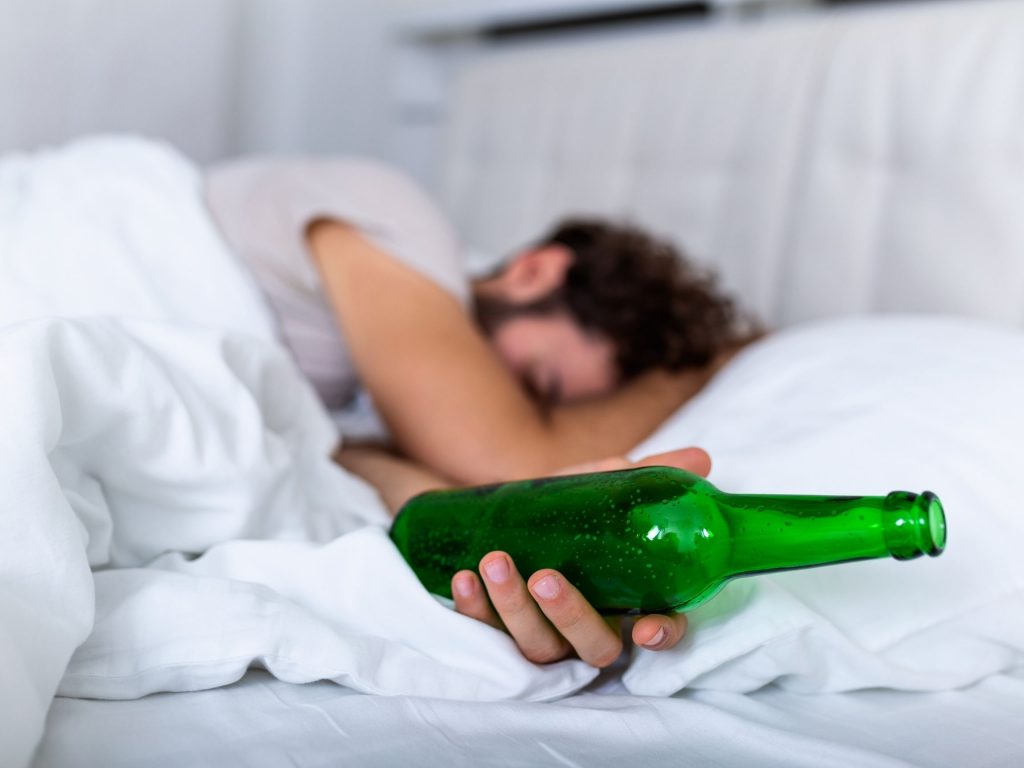Today I want to talk about another culprit: Alcohol. I am seeing more and more surfacing incognito in my practice and its connection with sleep. There are many reasons as to why alcohol may impact sleep and I will mention a few that are fairly obvious:
Alcohol is considered a diuretic which means it makes us go to the bathroom and urinate a lot. When this happens, we lose water and electrolytes, which are very important for the body to function properly. If this persists and we are not replenishing ourselves with food and hydration, this will lead to suboptimal Potassium (K) and Magnesium (Mg), which many people to are already deficient in naturally. Low Mg means that we will have difficulty falling asleep and calming our minds. It also makes it more likely to wake up soon falling asleep and may create leg cramps, otherwise known as a ‘Charlie Horse.’
We know from my previous newsletter that melatonin and cortisol compete with one another. The more drinks we consume, the more dehydration from diuresis. Resultantly, the body produces greater amounts of cortisol. This means that we are in fight or flight mode (sympathetic mode) and the body will not allow us to rest because it is fleeing from perceived danger. Melatonin is pushed to the side and it will only produce very small amounts later on in the night, just enough to allow you to sleep but not to go into deep sleep in order to keep you alert in case it senses an attack from the sympathetic receptors. When the body senses that it no longer is in danger (parasympathetic mode), it will then be able to focus on digestion, resting, healing and relaxation. The body will then be able to drop the cortisol levels and raise the melatonin levels and then are able to have a deep and lengthy sleep.
Leg cramps. As mentioned, these may only appear at night as we try to unwind, or we wake up at night because we experience stiffness in the calves. This can be due to Mg deficiency. However, if you experience persistent leg cramps throughout the day, then we are dealing with alcohol that needs to be mobilized out of the body because of the toxicity coming from the acetaldehyde. This is toxic and there could be blockages in the detoxification pathways of the liver which plays a very important role for detoxifying herbs, alcohol, meds and toxins. Alcohol is heavily dependent on a specific nutrient thiamine, B1, in order to prevent lactic acid build-up. When this nutrient is not replenished quickly enough, cramps will develop as a consequence of the lactic acid build-up. The reason behind this is that the cellular metabolism is not being met adequately from the mitochondrial function (the energy house in our cells)

Another important nutrient that we need in order to break down lactic acid that causes cramps is Zinc. I am noticing that many of my clients are deficient in this mineral too.
A summary of the points mentioned: Alcohol consumption causes dehydration and diuresis, and as a result we must make sure we have adequate Mg, Zinc, and Vitamin B1 levels, and are hydrated enough to break down the lactic acid build-up and muscle spasm that occurs from this, as well as to balance our cortisol and melatonin to guarantee good lengthy, restful sleep.
Other drivers:
Bar foods such as nuts and salty foods, refined carbs, sugary and fried foods such as nachos, potato skin and cakes along with alcohol consumption are not only high in calories, but also affect a certain neuron in the hypothalamus (the conductor in the brain) called AgRP: Agouti Related Protein. These increase the activity of these neurons and stimulate starvation mode. As a result, as soon as we take a drink, it increases food-seeking behavior even if you had just finished having your dinner.
You will end up overeating, going to bed feeling stuffed, heavy and bloated, and having a hard time falling asleep.
Eat your meal 2/3 hours before bed so that digestion has calmed down and you don’t have an over stimulated glandular activity going on. This will allow you to fall asleep easily.
Alcohol and sugary mixes. If consumed in the evening, this will cause high blood sugar peaks and troughs, especially after 1-2 hours. This is seen especially with insulin resistant individuals. They may have normal blood glucose levels but have elevated fasting insulin. This will drive blood sugar up soon after they have gone to bed. The surge of up and down will encourage the body to produce stress hormones to manage it because it needs to rescue the body from blood sugar dips. If you suffer from hypo-adrenal function (where your glands are not producing enough steroid hormones), this is where it is very apparent, and the body sends a pop of adrenaline while you are sleeping to wake you up.
An increase in cortisol is not only due to diuresis, there are other reasons we should be aware of that I shall recap and list below.
- A moderate to high consumption of alcohol increases cortisol due to heavy oxidative stress the body is dealing with from alcohol that leads to the toxic form of Acetaldehyde. This causes ongoing stress on the body.
- Food sensitivities that we are unaware of. When doing a blood prick test or an elimination diet, this will help you get in tune with your body’s reaction to certain foods.
- Ongoing mental, emotional and physical stress.
- Exposure to toxins: the body is responding to an ongoing daily intake of toxins, be it from the air we breathe, the chemicals in our food, the imbalance in microbiome, or the heavy metals we are exposed to. The body is trying to adapt and thrive in an environment we are asking it to live in.
- Trying to satisfy organs’ curiosity of AgRP neurons with foods that they have sensitivities or allergies to. That causes an increase in histamine production, which results in inflammation and leads to an increase in cortisol output, hence we end up with trouble sleeping. We may also get headaches, migraines or heart palpitations.
- We reach for a drink before going to bed because we feel it will relax us and we want to unwind from a heavy stressful day, only to be woken up 2/3 hours later—Why?
- This could be due to blood sugar imbalances. If a person has good fasting insulin and HbA1c, eats a well-balanced diet that does not contain refined carbs and sugar and exercises, then they should not have a problem. Unfortunately, the majority don’t follow this lifestyle.
- The other major reason is due to the GABA – GLUTAMATE balance in the brain that has shifted. GABA is known as the inhibitory neurotransmitter while GLUTAMATE is known as the excitatory neurotransmitter in the brain. One calms you down and the other keeps you excited and awake.
- Should we relax or do we need to be alert? The body shifts between the two, trying to keep it balanced depending on the time of day and how we need to respond to it.
If a person consumes a few more drinks, then Gaba, which is the preferred preference in the brain will be expressed 2-3 hours later and we will get a rebound affect and a surge of GLUTAMATE will kick in countering the previous GABA alpha binding receptor as explained above. If this confused you, don’t worry. It means that although Gaba should increase and make you fall asleep, the surge or the increase in GLUTAMATE which is the excitatory/stimulating neurotransmitter will kick in after a few hours of excess alcohol consumption and will wake you up, especially if the individual is already under significant stress.
I hope I was able to explain the impact alcohol has on sleep for some of you who may be having issues with this. Understanding the importance of making sure that your liver is detoxifying well; that you are consuming supplements that contain the key nutrients that many people are so deficient in due to the stressful life they lead; the importance of a good clean diet and the role exercise plays on your body is super important to provide a good night’s sleep.
I hope you have a better understanding now as to why consuming alcohol is not really a good idea to use as a mean to help you unwind and fall asleep. A much more effective remedy to incorporate into yoru life is to take an Epsom salt bath, deep breathing, stretching and meditation before going to bed, to ensure a deep and restful night’s sleep.
Always looking out to better your health Small Changes for a Healthier “U”







